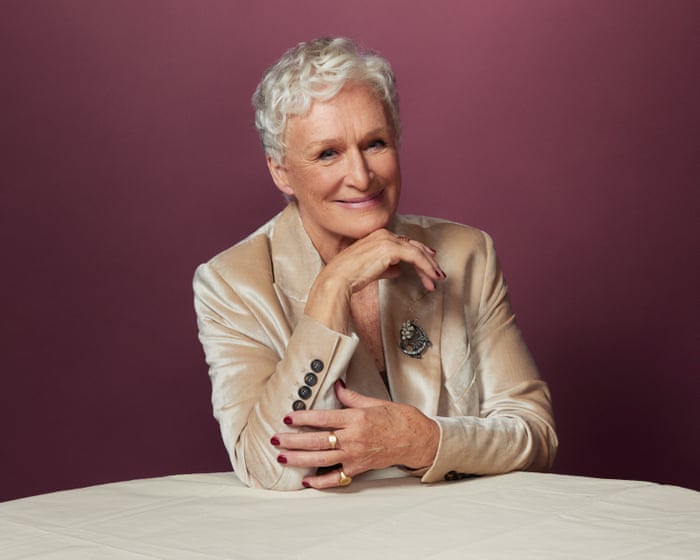Halfway through our hour-long conversation, David Duchovny slumps in his chair and gently scolds me. “I got tired while you were talking,” he groans. To be fair, I had been speaking a lot, but only because I was trying to list everything he’s accomplished in the past year.
There’s his podcast, Fail Better, where he’s drawn remarkably open interviews from famously private stars like Alec Baldwin and Robert Downey Jr.—more on that later. Then there’s his poetry collection, About Time, which was published last month. He also hosts the History Channel series Secrets Declassified With David Duchovny. As we talk, he’s just wrapped up an eight-date tour, performing songs from the three folk-rock albums he’s released over the last decade. We’re supposed to be discussing Malice, his new Prime Video series. If we had spoken a few weeks later, who knows how many new projects he would have taken on. So, it’s no surprise he’s exhausted.
Malice is a good starting point. This six-part psychological thriller, partly set in Greece, features Duchovny as a rude, wealthy venture capitalist whose family is terrorized by a disturbed nanny played by Jack Whitehall. I have to admit, at first glance, the plot sounded a bit like one of those TV movies Channel 5 airs on weekday afternoons. However, Malice was written by James Wood, the creator of the brilliant sitcom Rev, so the tone is smart and engaging. And for anyone eager to see David Duchovny’s backside, you won’t be disappointed—it’s shown within the first five minutes.
“I hate that that’s how the character is introduced,” he grimaces when I bring it up. “That’s not the direction he’s going. But I suppose it’s okay.”
What he will become—and this isn’t a spoiler, since it’s revealed in the very first scene—is dead. And it’s pretty clear who’s responsible. You could call it Chekhov’s Deranged Nanny.
“This isn’t a whodunnit because you know who did it right from the start,” Duchovny smiles. “At first, I was worried about that. Like, who’s going to keep watching if we give it away? For me, the challenge was making it believable that my character doesn’t figure out this guy is trying to kill him without making him seem stupid.”
Duchovny is quick to praise Whitehall, who makes his dramatic debut here. “If comedians commit to the acting side, they can be some of the best actors,” he says of Whitehall’s eerie performance. “Doing standup is the scariest situation—standing in front of a crowd and having to make them laugh. They can be very brave people.”
You could say Duchovny is just as brave. Much of his work outside acting involves deeply personal exploration, allowing him to confront his inner struggles in ways his acting career doesn’t permit. Part of why he gets his Fail Better guests to open up so freely is his own willingness to be vulnerable first. He got Downey Jr. to talk about his addiction and jail time—a topic that has made him walk out of interviews before—by sharing his own experiences with AA.
His interview with Gillian Anderson, with whom he had a strained relationship during The X-Files, is revealing. For an hour, they discussed things left unsaid for decades, from Duchovny not supporting Anderson’s request for equal pay to their failure to tell each other about wanting to leave the show.In Malice. Photograph: Amazon
Moreover, his poetry collection can be so personal that it’s almost unsettling to read. One poem, “Dead Seven,” deals with the loss of his father; another recounts the moment he had to confront the sight of a dead mouse while walking with his three-year-old daughter (“It is Daddy who cannot face too much death,” he writes).
The book’s introduction asserts that “Poetry is not useful. And that is exactly why we need it.” This idea seems to shape Duchovny’s entire perspective: that a wandering quest for personal satisfaction will always surpass relentless ambition. “I have young children starting their careers, and it seems much grimmer than when I was their age,” he remarks. “In school, everything was about ‘How is this useful? How will this be applied?’ Everything is utilized, everything is efficient, and it’s seen as virtuous. As if, if you can’t use it, there must be something wrong with it. Imagine not having to concern ourselves with monetizing something and just enjoying it for what it is.”
Consequently, he views his writing, music, and podcasting as forms of play. “I enjoy playing different games,” he says. “I take play very seriously, but I don’t want to come across as a pretentious jerk either.”
Duchovny describes Malice as “a binge-worthy series,” with all six episodes released simultaneously. This contrasts sharply with the role that brought him fame, Fox Mulder in The X-Files, where he worked ten months a year for seven years. When I mention it, I feel a bit guilty, assuming he must dread the topic coming up in every conversation.
“It’s not dread, but I probably don’t have much new to say about it,” he shrugs. I reflect on how The X-Files was a product of the old network era, with seasons of 25 episodes and another 25 ready for the next year. “It’s unthinkable now,” he agrees. “Look at shows as great as Game of Thrones or The Sopranos. We did over 200 episodes, and they’ve done 60 or 70. That’s not to belittle them at all—they’re fantastic artistic achievements—but the sheer volume we produced is also impressive.”
What stands out to him even more is that each X-Files episode had to be self-contained. “It’s a real credit to the writers’ room and to [creator] Chris Carter,” he notes. “We’re not talking about 25 episodes of Law and Order with a new case each week. We’re talking about 25 episodes that could each stand as a movie. I’m just glad I only had to memorize the lines.”
The fact that the show lasted so long while maintaining high standards is what he takes the most pride in. “No one gives awards for that,” he says. “No one recognizes the combination of quantity and quality. But I think they should. In my mind, I award Chris Carter and the writers, and Gillian and I for the effort it took to produce 25 episodes in ten months. Nobody honors how challenging that show was to make. But I know it was.”
Duchovny left The X-Files after seven seasons, partly due to exhaustion and partly feeling confined by the show’s massive success. “When I first left, I thought, ‘I just want to create art, and I only want 100 people to appreciate it.’ I was reacting against that worldwide adoration. I told myself, ‘Never again. I’m going to focus on artistic projects, small theaters, and make a truly unpopular TV show.'”Back in the day… David Duchovny as Fox Mulder with Gillian Anderson as Dana Scully in The X-Files. Photograph: 20th Century Fox Television/Kobal/REX/Shutterstock
Leaving The X-Files at the height of its worldwide fame was arguably the best decision he could have made. While he later starred in another long-running series, Californication—which was popular enough to earn him a Golden Globe—stepping away gave him the freedom and courage to reveal his true self.
He admits he still feels torn between the security of television, with its predictable schedules, routines, and steady income, and the riskier paths in his career where he’s willing to invest more of himself for a possibly smaller audience. “I treat the smaller projects almost like family-run businesses because I have control over everything,” he explains. “Then you compare that to something like The X-Files or a major Amazon show, which is definitely not mom and pop.”
“For me, at this stage, it’s always about finding the work that truly resonates,” he continues. “Some projects speak to me less clearly, but they’re interesting from a life perspective. I believe saying yes takes you further than saying no.”
Considering everything he’s done, not just in the past year but over the last thirty years, this seems to be Duchovny’s guiding principle. “Saying no might lead to a consistent career,” he smiles, “but saying yes makes it an adventurous one.”
Malice will be available on Prime Video starting November 14.
Frequently Asked Questions
Of course Here is a list of FAQs based on the topic designed to be clear concise and naturalsounding
General Beginner Questions
Q What is this interview with David Duchovny even about
A Its a conversation where he discusses his new TV show his thoughts on poetry and his recent work on podcasts
Q What show is he returning to television for
A While hes been in many shows this interview is likely about his return for a new project or season possibly for a series like The XFiles or a newer show hes starring in
Q What does he mean by I cant believe they show my backside in the opening scene
A Hes humorously commenting on a scene from his new show where the opening credits or first scene features a shot of him from behind showing his backside
Q Is David Duchovny a poet as well as an actor
A Yes he has written and published books of poetry and he often discusses his love for the art form
Deeper Advanced Questions
Q How does David Duchovny connect his acting work with his interest in poetry
A He sees both as forms of storytelling that explore human emotion and truth He often finds that the concise emotional language of poetry influences his approach to a character
Q What podcasts has he been involved with recently
A He has his own podcast where he discusses various topics and he is also a frequent guest on other popular podcasts where he talks about his career writing and new projects
Q Why would an actor of his stature agree to such a revealing scene
A Its often a creative choice to establish a characters vulnerability rawness or to make a specific artistic statement For a seasoned actor its about serving the story
Q What are the benefits of a veteran actor like Duchovny moving into podcasting
A Podcasting offers a direct intimate way to connect with an audience share ideas without a studio filter and explore topics hes passionate about like poetry and literature in a longform format
Common Problems Practical Tips
Q I heard about the scene but havent seen the show Where can I watch it
A You would



